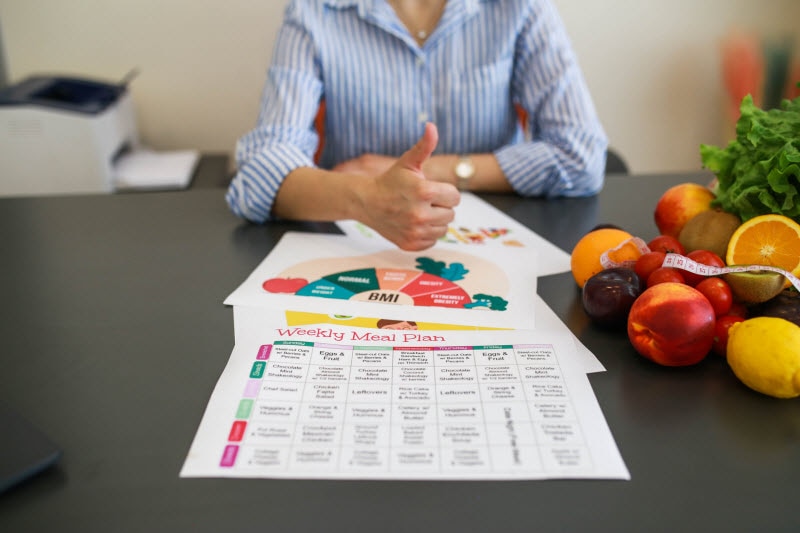[vc_row][vc_column][vc_column_text]If you are struggling with weight gain – or simply want to eat more healthfully – you might consider making an appointment with a
registered dietitian or a nutritionist.
But which of these two types of experts is the better choice for you?
Contrary to what some might believe, the terms “dietitian” and “nutritionist” are not interchangeable. So, it is important to understand the differences.

What is a dietitian?
A registered dietitian (RD) or registered dietitian nutritionist (RDN) is a nutrition expert who has at least a master's degree in nutrition science and who has completed at least 1,000 hours of supervised practice.
These professionals also must sit for a national exam to earn a credential from the
Commission on Dietetic Registration, which is the credentialing agency of the Academy of Nutrition and Dietetics.
Dietitians are considered to be board-certified medical professionals and experts in food and nutrition. They often work with clients who have medical conditions, using medical nutrition therapy to help treat disease.
Dietitians may be found in many different settings, including:
- Hospitals and doctor offices
- Nursing homes
- Government organizations
- Gyms and recreation centers
Dietitians must complete at least 75 hours of continuing education in the nutrition sciences every five years. Some states require registered dietitians to be licensed.
"The RD or RDN is often specialized in additional areas within nutrition, like sports nutrition, oncology or pediatrics," says Angela Lemond, a Texas-based registered dietitian nutritionist and co-founder of
Lemond Nutrition.
Areas of specialty credentials include:
- Gerontological nutrition (CSG)
- Sports dietetics (CSSD)
- Pediatric nutrition (CSP)
- Renal nutrition (CSR)
- Oncology nutrition (CSO)
What is a nutritionist?
A nutritionist is more likely to work with someone who does not have a medical condition, but who simply wants to boost their health through better eating.
A nutritionist is generally not considered to be a health professional. In addition, there are no formal standards for becoming a nutritionist, which means virtually anyone can claim the title, Lemond says.
“The word ‘nutritionist’ is a super-generalized term that can be used by anyone in most places in the United States,” she says.
Many people who call themselves nutritionists have some expertise in food and diet matters, and they might even have formal education in nutrition.
In fact, nutritionists can seek out certifications that signal their expertise to potential clients. It is even possible to earn credentials such as “
clinical nutritionist” by completing university-level coursework.
From there, you can earn the title certified nutrition specialist by completing 1,000 hours of supervised practice and taking an exam. The Board for Certification of Nutrition Specialists (BCNS) is responsible for this certification.
In some states, nutritionists who do not earn a credential are not allowed to provide individualized meal plans or specific guidance related to health issues.
Should you choose a dietitian or a nutritionist?
Overall, the standards for calling yourself a nutritionist are not as rigorous as those for professionals who earn the title of dietitian.
And while all dietitians are nutritionists, the reverse is not always true.
Lemond cautions that if you decide to work with a nutritionist, it’s possible you will end up with someone who has little to no professional training.
"There are weekend courses a person can take to get a 'certified nutritionist' title, so be careful," she says.
Picking the wrong nutritionist can actually be dangerous in some situations, she adds.
“Nutritionists may cost less money, but the real cost could be a person's health risk,” Lemond says. “There are hundreds of cases of people getting very sick or even dying by following advice from people without advanced nutrition education.”
The Academy of Nutrition and Dietetics also urges caution if you decide to work with a nutritionist, noting that “unqualified health care recommendations can cause people harm.”
To get the best care, you are likely better seeking out a fully credentialed dietitian, Lemond says. She suggests looking for a dietitian who is an RD/ RDN with expertise in the subject matter where you need guidance.
“RDs/RDNs are evidence-based, not operating from simply what is trending or by testimonials,” Lemond says. ‘They communicate the science in that area of nutrition, and most have practical ways to implement the recommendations.”
Finding the right dietitian or nutritionist
Lemond notes that as with any profession, each registered dietitian or registered dietitian nutritionist varies by personality and approach.
“Once you find someone in the area of need, contact them,” she says. Most will give you a five- to 15-minute introduction call so you can see if the person is a good fit for your unique needs, she adds.
“The good news is that many RDs/RDNs are covered under insurance plans in most states,” Lemond says.
To find the right professional for you, Lemond suggests going to the
Academy of Nutrition and Dietetics website and clicking on "Find a Nutrition Expert."
If you decide to pursue the help of a nutritionist, Lemond recommends going to the nutritionist’s website to make sure he or she has earned at least a master's degree in nutrition-related education.
"Even if a person has a large following and an impressive website, go to their biography," Lemond says.
Typically, health insurance plans will not cover sessions with a nutritionist. So, of you choose this route, expect to pay the cost out of pocket.[/vc_column_text][/vc_column][/vc_row][vc_row][vc_column][vc_text_separator title="Featured Products" border_width="2"][vc_row_inner equal_height="yes" content_placement="middle" gap="35"][vc_column_inner width="1/3"][vc_single_image image="183649" img_size="full" alignment="center" onclick="custom_link" img_link_target="_blank" css=".vc_custom_1744336326009{padding-right: 7% !important;padding-left: 7% !important;}" link="https://www.vitacost.com/organic-traditions-supergreens"][/vc_column_inner][vc_column_inner width="1/3"][vc_single_image image="183650" img_size="full" alignment="center" onclick="custom_link" img_link_target="_blank" css=".vc_custom_1744336361716{padding-right: 7% !important;padding-left: 7% !important;}" link="https://www.vitacost.com/codeage-easy-veggies-fast-fruits-vitamins-vegan-superfood-multivitamins-minerals-supplement"][/vc_column_inner][vc_column_inner width="1/3"][vc_single_image image="183651" img_size="full" alignment="center" onclick="custom_link" img_link_target="_blank" css=".vc_custom_1744336395972{padding-right: 7% !important;padding-left: 7% !important;}" link="https://www.vitacost.com/plantfusion-womens-organic-one-a-day-multivitamin-whole-food-blend-60-vegan-tablets"][/vc_column_inner][/vc_row_inner][/vc_column][/vc_row]





